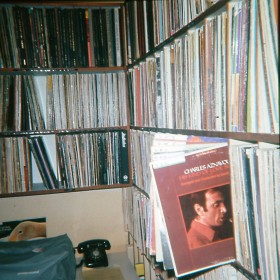GREAT SCOTT! 40 Years Behind A Mike - By Richard (Dick Scott) Pratz
CHAPTER: The Great White North (Continued)
From the time I was six years old in 1943 and a kindergarten student in Mrs. Teeple’s class at Chappell Elementary School in Chicago, I grew to love classical music. Once a morning Mrs. Teeple would sit down at the piano in our classroom and play the frenzied portion of Franz Liszt’s “Hungarian Rhapsody No. 2” as we kids held hands and danced furiously around a large red circle painted on the floor. We danced in time to the strains of her pounding away on that piano until we tired ourselves out. Then it was nap time and we all laid down on throw rugs we’d brought from home and take naps. It was probably a much-needed rest for Mrs. Teeple who had worked us into a dither with Liszt! That was my introduction to classical music. Next came radio’s “The Lone Ranger” and its familiar theme of Rossini’s “William Tell Overture” with snippets of Liszt’s “Les Preludes” heard here and there for segues. Then came the familiar strains of Sir Edward Elgar’s “Pomp and Circumstance March” heard at all graduations in those years.
My taste in music was (and still is) eclectic, but oh how I loved the bravado and gusto of the light classics including Ferde Grofe’s “Grand Canyon Suite” which I utilized for many of those “home entertainments” during my childhood. I even remember taking a long wooden spoon from my mother’s kitchen and pretending to conduct imaginary symphony orchestras (something I occasionally still do in private when no one is watching)! I first came to the attention of CKSO-FM Manager Eileen Forbom when it became known I could wrap my tongue around many of the more difficult names associated with the classics. If I wasn’t always accurate, I sure made it sound good! A little trilling of the tongue always helped. I hosted a few classical music programs on CKSO-FM and eventually wound up with three of my own - “Nightfall” from 6pm to 7pm weeknights .... “Rhapsody” from 1Opm to midnight Monday through Friday .... and “Sunday Concert”, Sunday nights from 9pm until midnight. For those eighteen hours of programming I contributed to the FM station per week, I wouldn’t actually have to be in the studio. Around 11 o’clock each morning, I would ‘voice track’ my segments of the shows. That is, I went into a booth and an engineer would record my chatter about each selection. When it came time to air the program the technician would play back my taped voice track and insert the recordings. With my morning news and comedy routines, plus a nighttime TV talk show I’ll mention later, I was often on the air in one form or another competing with myself! For a period, I used Frederic Chopin’s “Les Sylphides Prelude in A Major” for my theme ... one I stole from a classical radio show in Chicago during my growing up years. It’s a beautiful piece of music and very adaptable as a theme. As you have already learned, Sudbury was basically a mining town and not exactly the classical music mecca of Canada. The secret to my classical music on-air success was my idol from my younger years, Arthur Godfrey! Although Arthur never dabbled in the classics, I copied his humorous, comfy, down home, casual approach and applied it to my classical music patter. Up to then, any classical music shows I’d heard were always stilted and therefore boring. By using this Godfrey style I interjected personal recollections of this and that about a particular piece I played and laced it with as much dignified humour as I could. I also never talked down to the listener and always spoke as you would to a friend on a one-to-one basis. When I didn’t know something about a particular piece, I’d admit it and urge listeners to write me with the answers. This made them feel like part of the show, especially after I’d read their letters on the air and refer back to the music. Fans began to realize they could get mentioned on my shows if they wrote in. This way, not only did the mail increase, so did my listeners! All these approaches had never been heard in Sudbury and I unabashedly admit they catapulted my three FM programs to new heights. I told interesting stories about each composer that tended to bring the likes of Mozart down to the everyday listener. (I even included Mrs. Teeple in my stories). Do you know Chopin’s “Minute Waltz” was inspired by a puppy chasing his tail and if played in one minute it would be musically disastrous if not impossible? Do you know Prokofiev’s March from “The Love For Three Oranges” was the theme for a radio detective series? Do you know Enrico Caruso recorded 260 records before he died in 1921, a hefty feat for those days. Do you know the hippo’s in tutu’s from Disney’s “Fantasia” danced to Ponchielli’s “Dance of the Hours” from “La Gioconda”? Comparing the lineups at concerts of today, I’d relate facts such as when Edvard Grieg gave his last concert in London, England as both a composer and a pianist, people waited in the streets from 9am to 8pm before the doors opened .... something unheard of in the late 1800s. Listeners related to much of this and therefore focused on the music more closely. Sure people had heard of Tchaikovsky’s “Swan Lake Ballet”, but how many of my mining community fans knew the music was rooted in the ancient legends of the transformation of woman-into-bird by evil magic? It was all about grabbing their attention from the thousands of classical music ‘asides’ I culled from the back of album covers and in my ‘bible’ - Norman Lloyd’s “The Golden Encyclopedia of Music” (Golden Press 1968). I once mispronounced composer-conductor Leonard Bernstein’s name, calling him Bern-STEEN instead of Bern-STINE. Some listeners sided with me while for others it meant war! Controversies were great for business, so I wrote “Lenny” August 7, 1974 and asked him for the proper pronunciation. Bernstein (1918-1990) was perhaps the most influential figure in classical music in the last half of the twentieth century. Composer, conductor, author, lecturer and often controversial media personality, the American-born Bernstein had a dramatic impact on the popular audience’s acceptance and appreciation of classical music. His own work as a composer, particularly his scores for such Broadway musicals as “West Side Story” and “On The Town” helped forge a new relationship between classical and popular music. In my letter to Bernstein, I told him the approximately 400,000 listeners to my programs were discussing the proper pronunciation of his name and a simple remark by me had snowballed into a tempest-in-a-teapot. I asked him to set the record straight. I received a nice reply from Mr. Bernstein’s secretary Helen G. Coates written on stationary from the New York Philharmonic’s Avery Fisher Hall. She said his name was pronounced “Bern-stine”. The reply prompted a phone call from me to thank him (a call made on the air) and led to a short interview with the man himself! He got a good laugh out of it and was most gracious.


